Sarah's Herbal Garden
Colon, Lymph, Kidney, and Liver Detox
Colon, Lymph, Kidney, and Liver Detox
Couldn't load pickup availability
Tincture bottles: 2 fl. oz. (56.7 g)
Tea packet: 0.5 oz. (14.2 g)
THIS PRODUCT IS NOT INTENDED FOR USE IN PREGNANCY AND BREASTFEEDING.
This full detox is a 3 month colon, lymph, kidney, and liver cleanse! Click here for more detox information.
*It is highly advised to take a trace mineral supplement during this protocol.*
Included in this detox kit:
- 7 day Clean Colon (1 oz) including 1 reusable tea bag
- Lymph Detox Tincture (30 day supply)
- Kidney Detox Tincture (30 day supply)
- Liver Detox Tincture (30 day supply)
- Booklet including step-by-step instructions for lifestyle detox measures to accompany the herbal detox regime
***If this is not your first detox, you can take all 3 tinctures together (1 mL each twice daily) for 30 days instead of separating them into 3 months.
Herbs help support the body's filter organs to help eliminate toxic waste from the body, helping to improve organ function.
This herbal detox is part of the multi-faceted bodily detox process. We suggest working to eliminate toxin exposure in food and environment when possible. Click here for more in-depth information and tips for detoxification.
PLEASE NOTE: It is normal to feel some discomfort as you go through a detox. These are all positive signs that your body is working to cleanse.
If you are experiencing extreme discomforts that might indicate an allergic reaction, stop taking immediately.
These statements have not been evaluated by the Food and Drug Administration. This product is not intended to diagnose, treat, cure, or prevent any disease. Consult with healthcare provider if pregnant or breastfeeding, have any underlying health conditions, beginning an herbal supplement for the first time, or are taking other medications.
Share
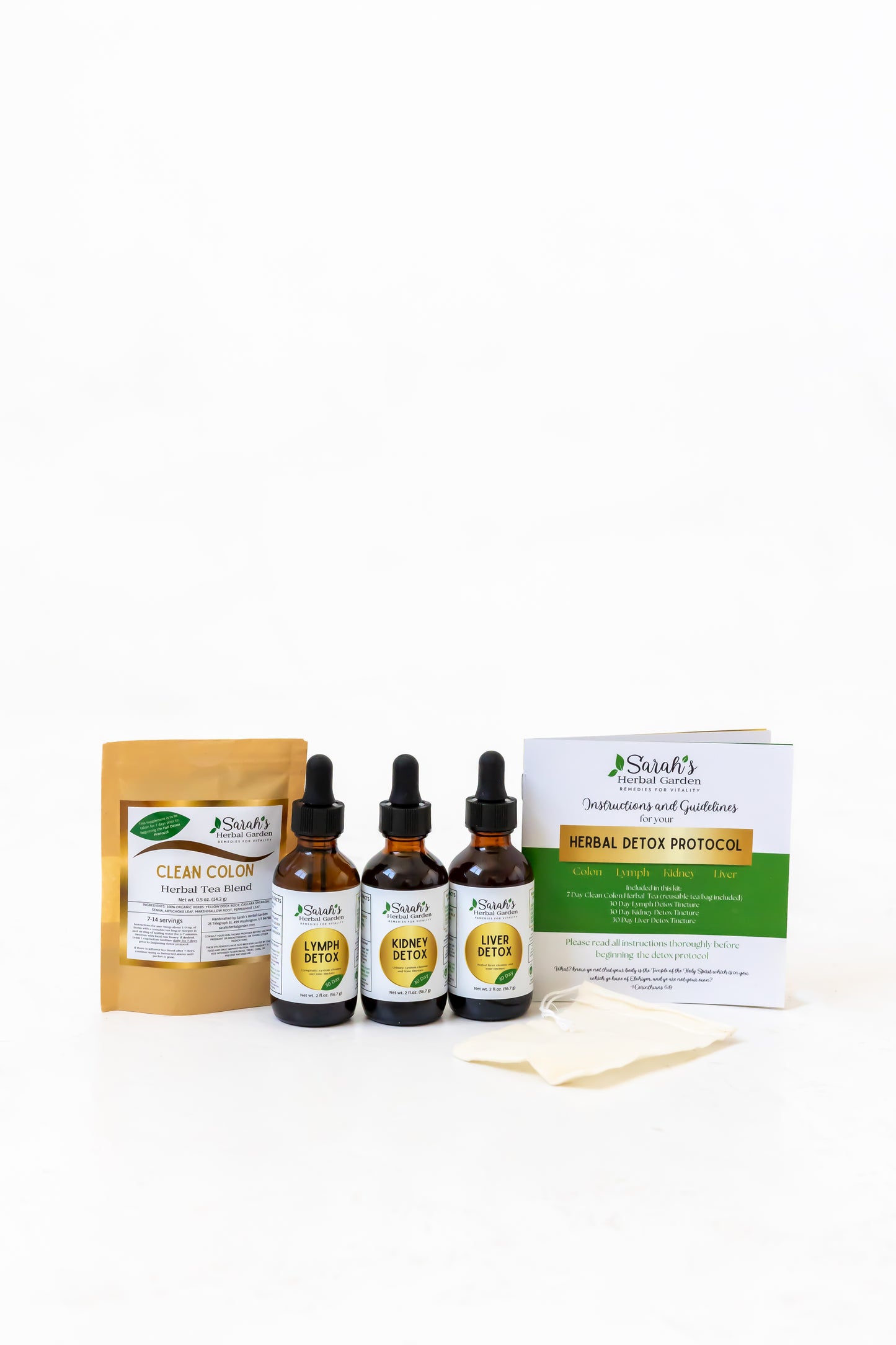
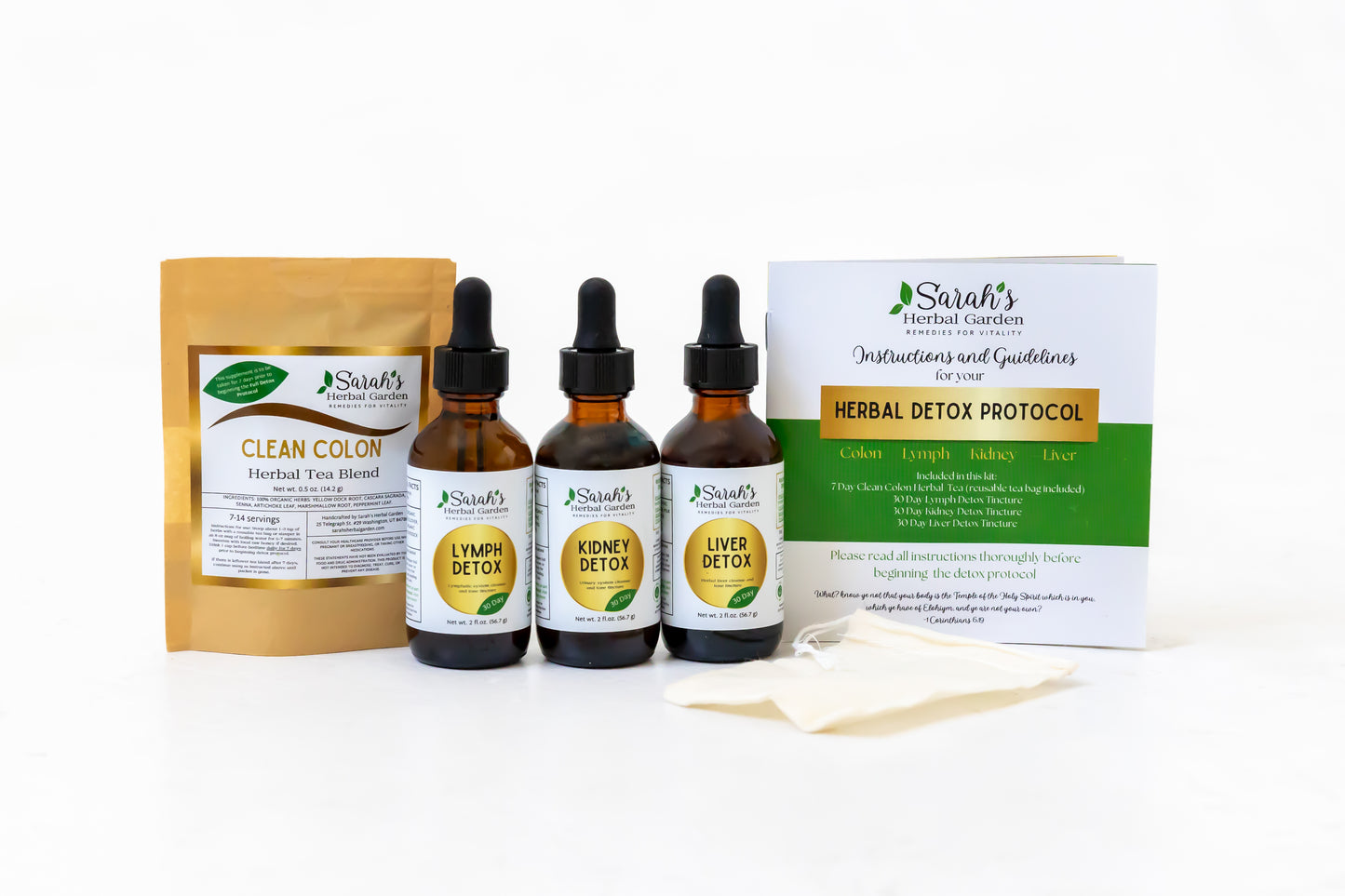
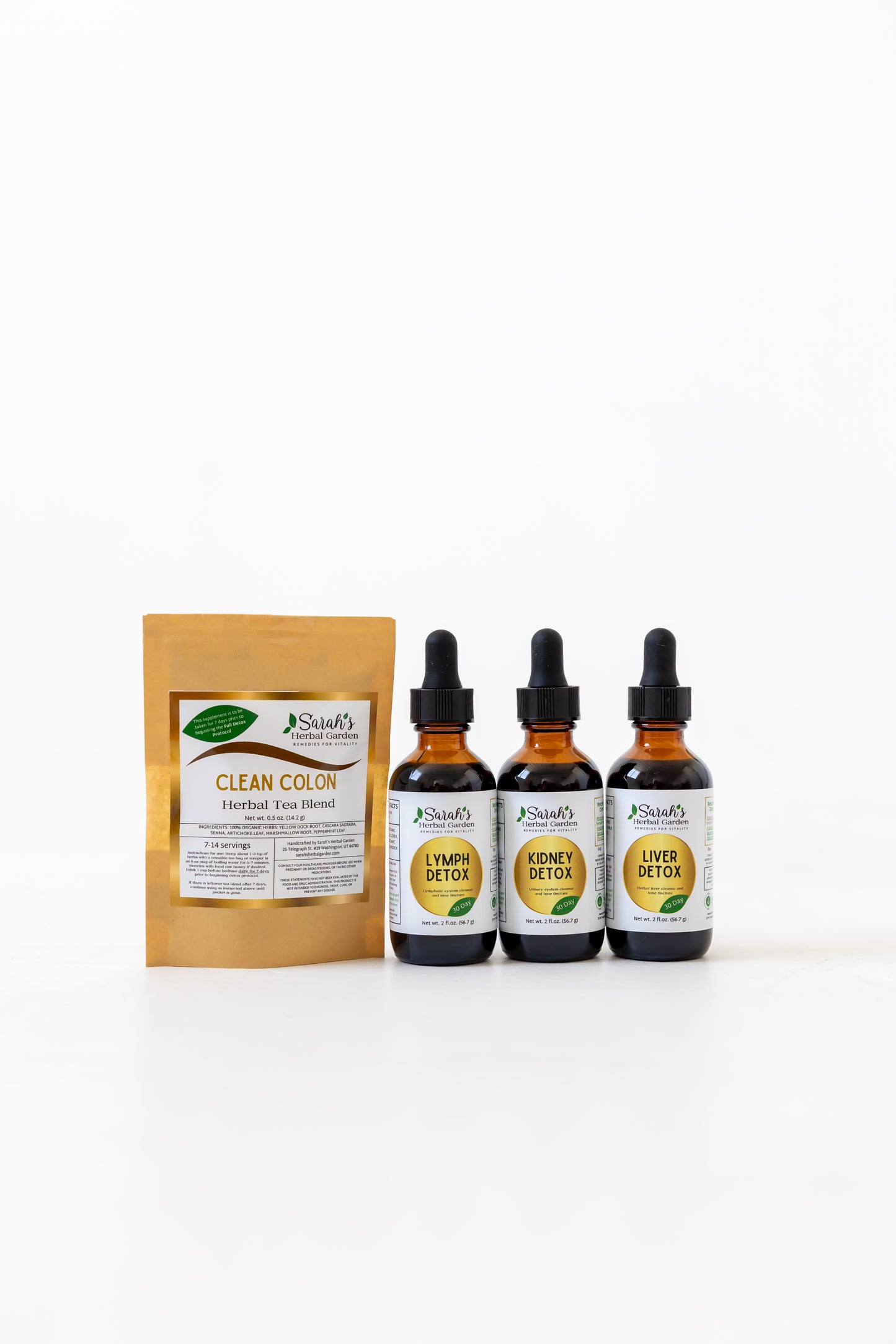
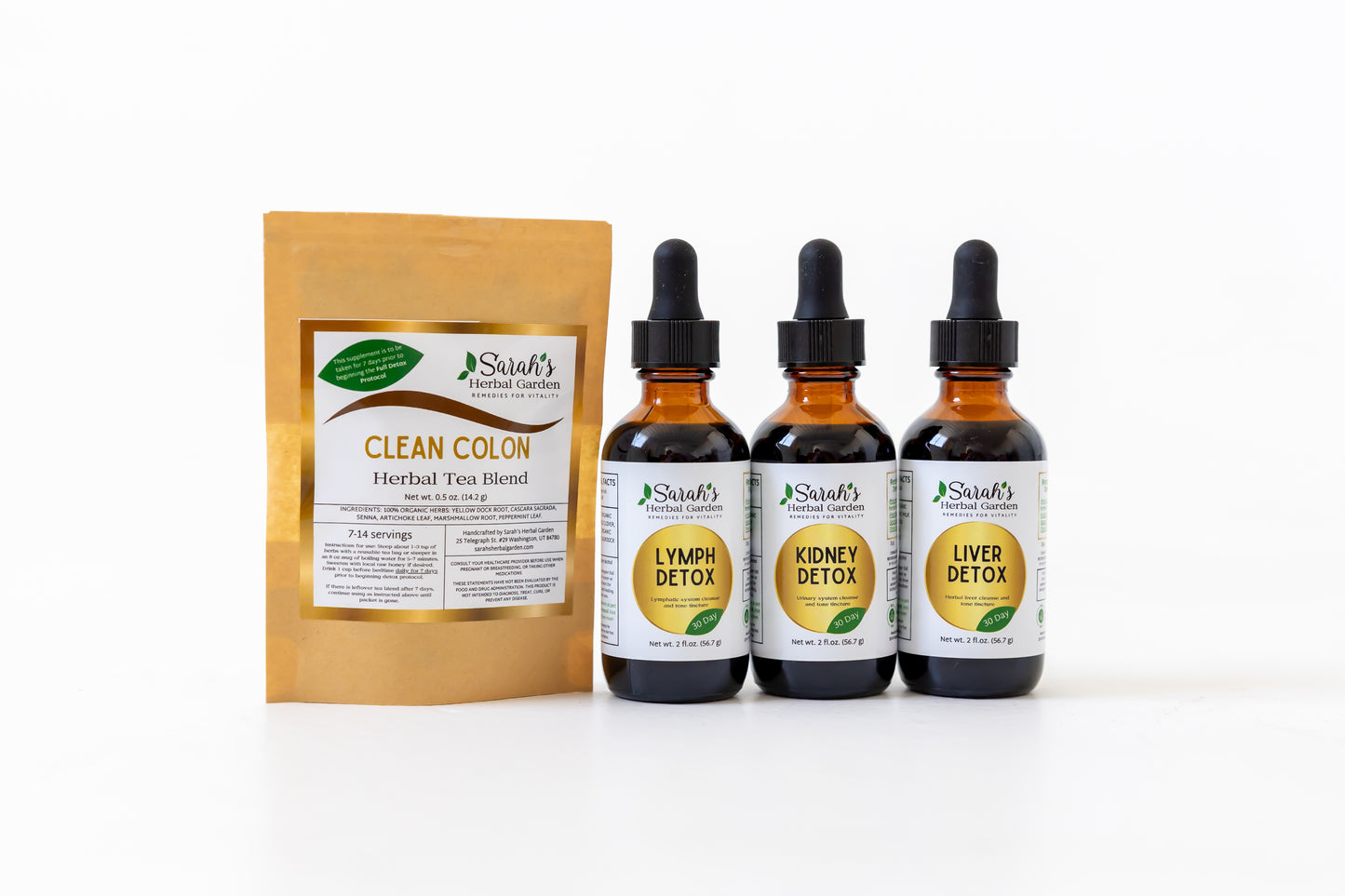
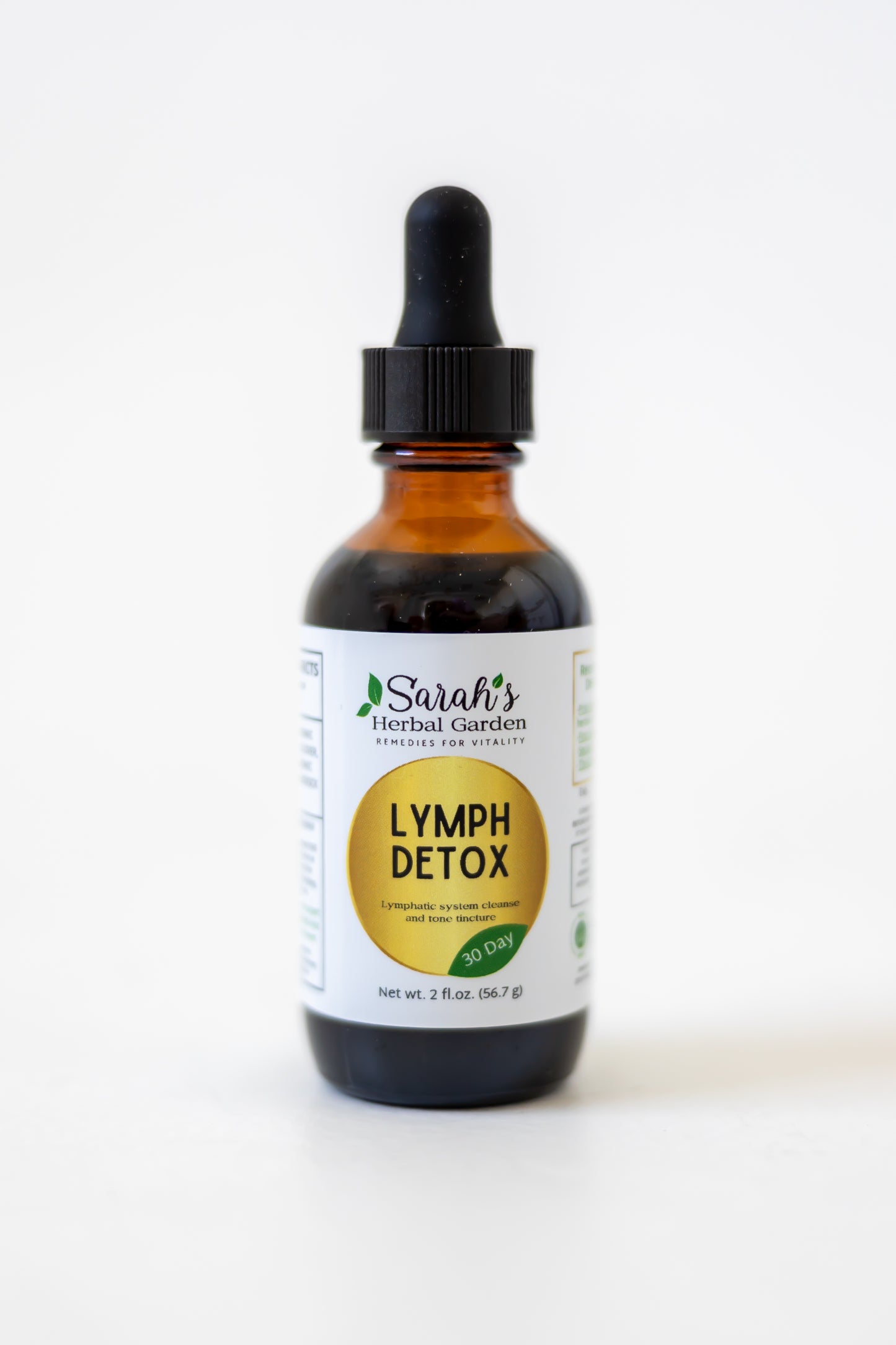
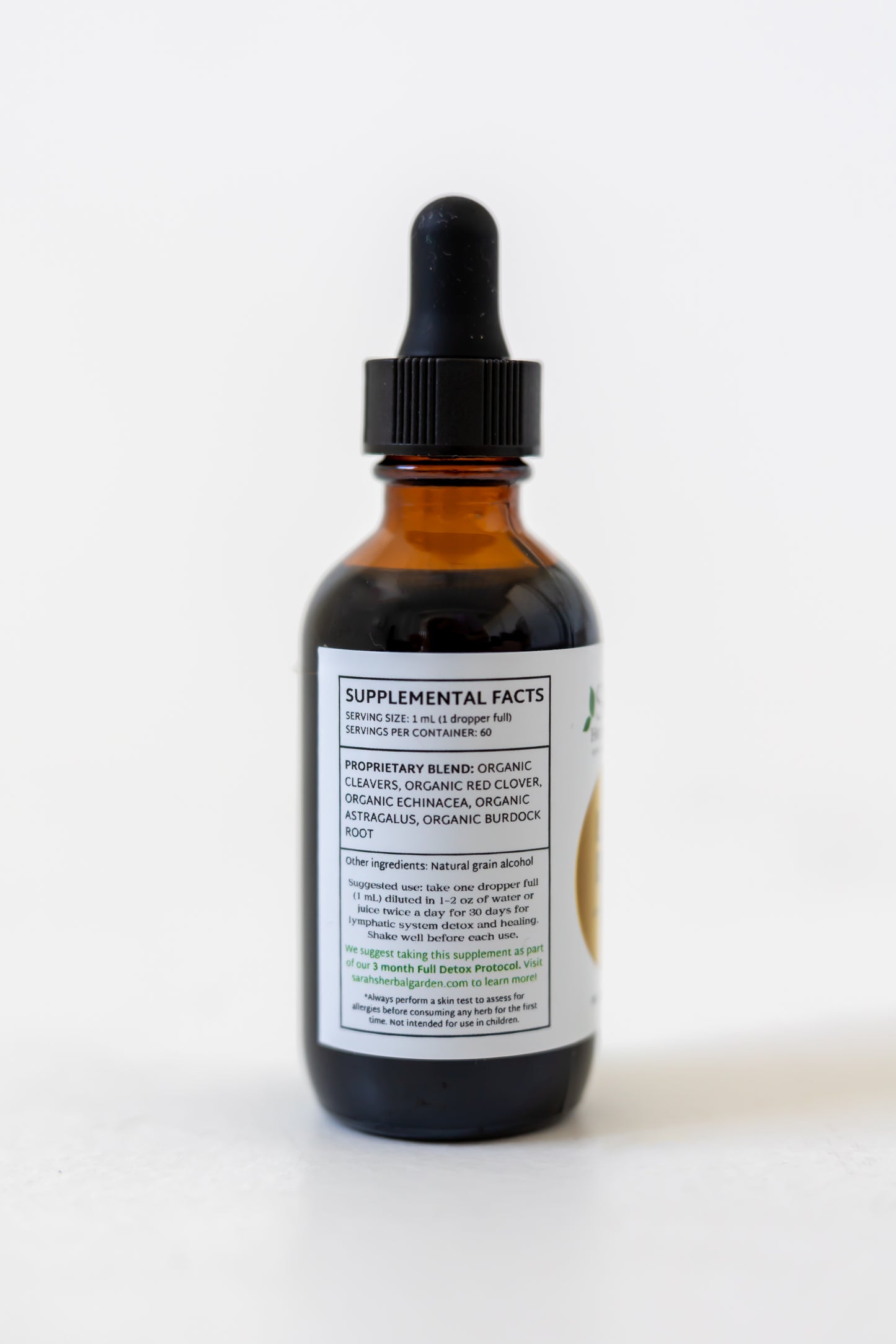
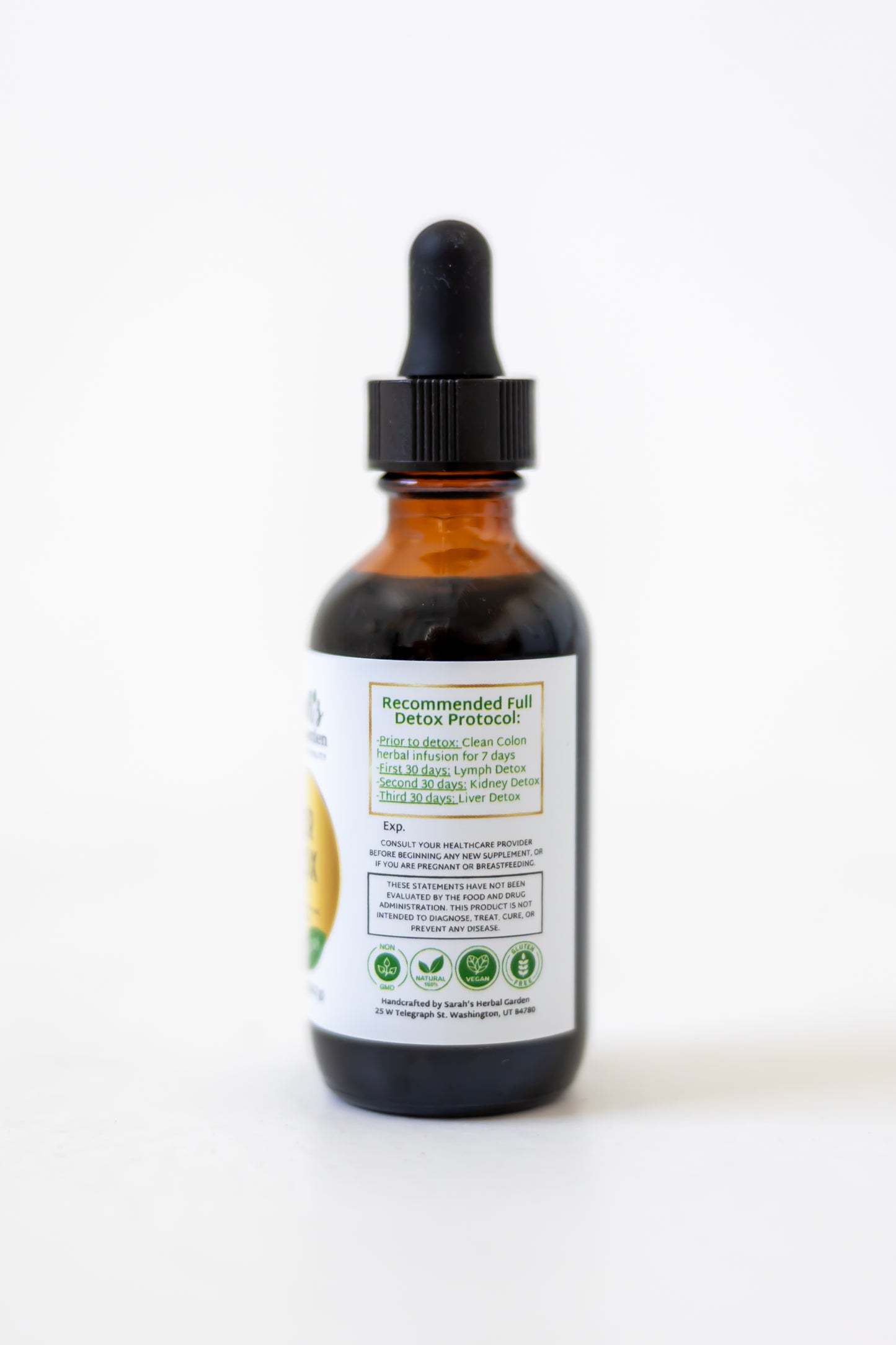
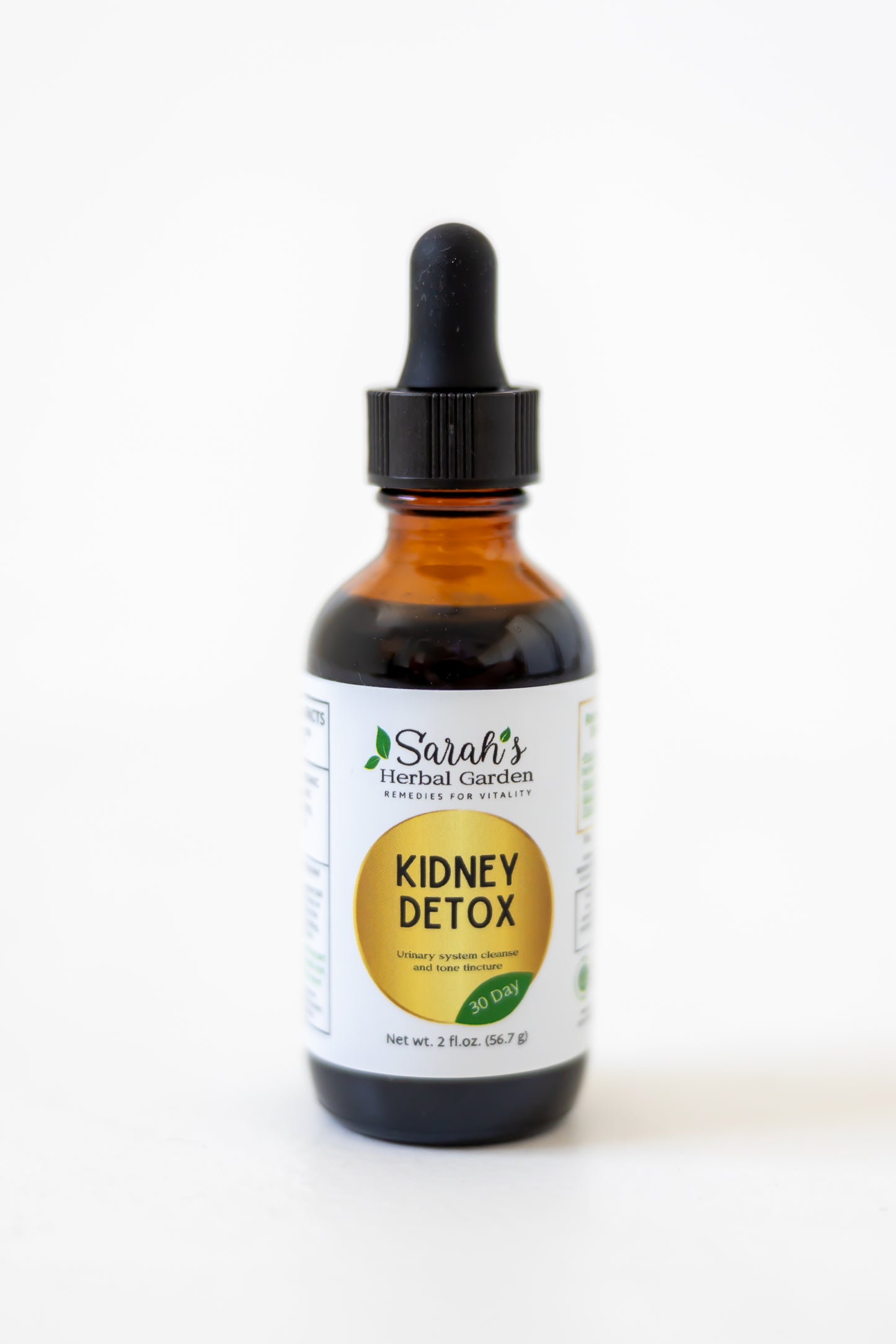
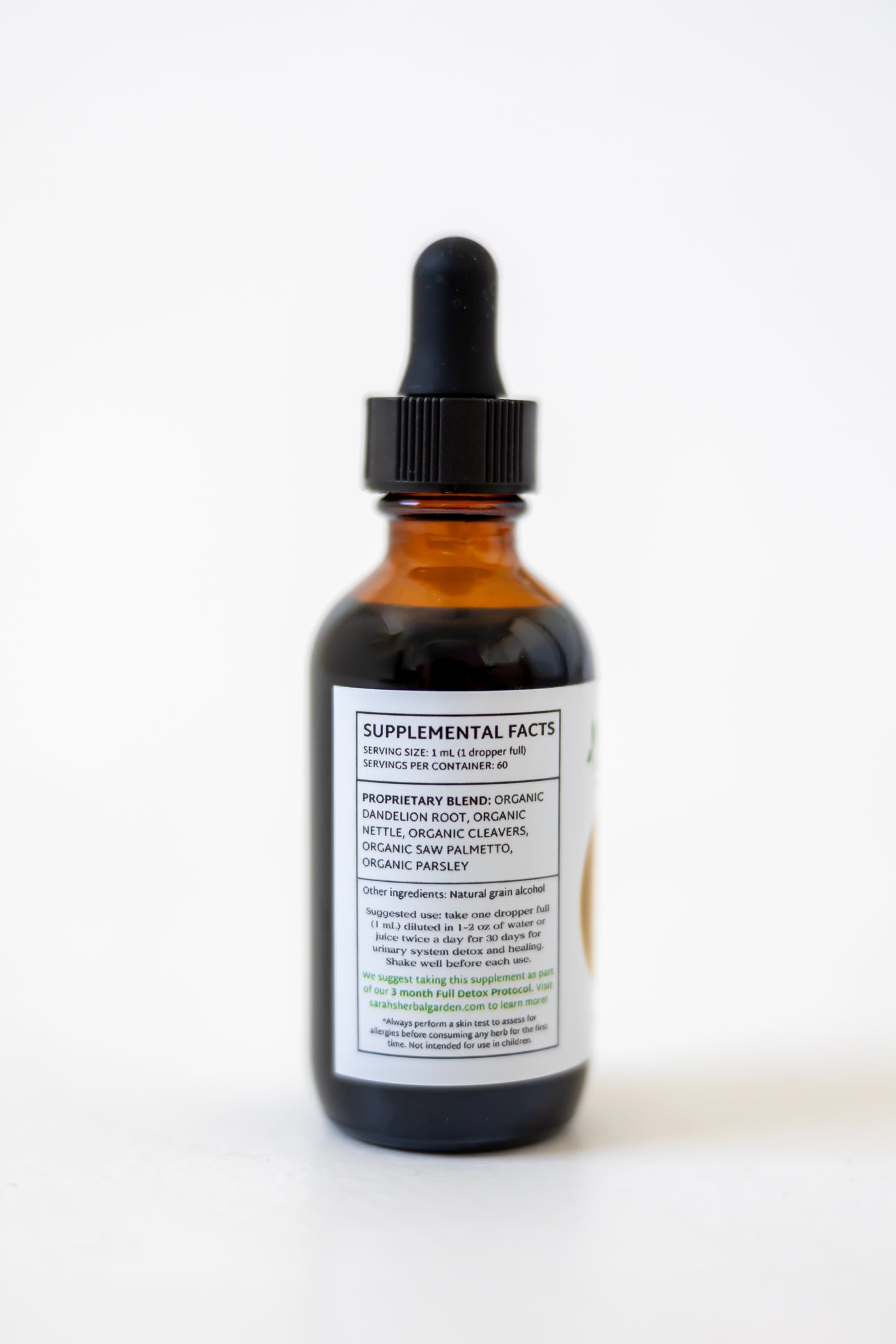
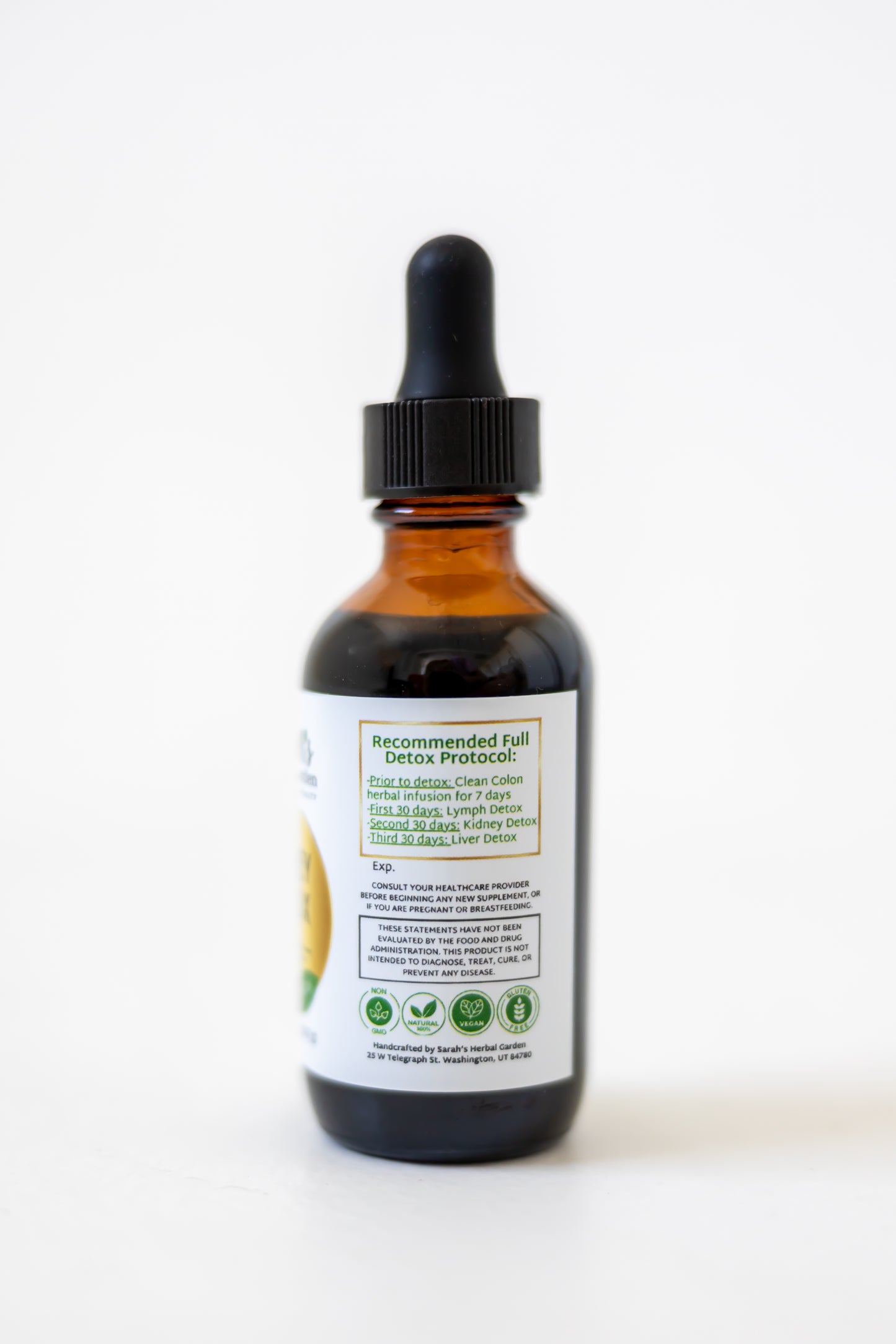
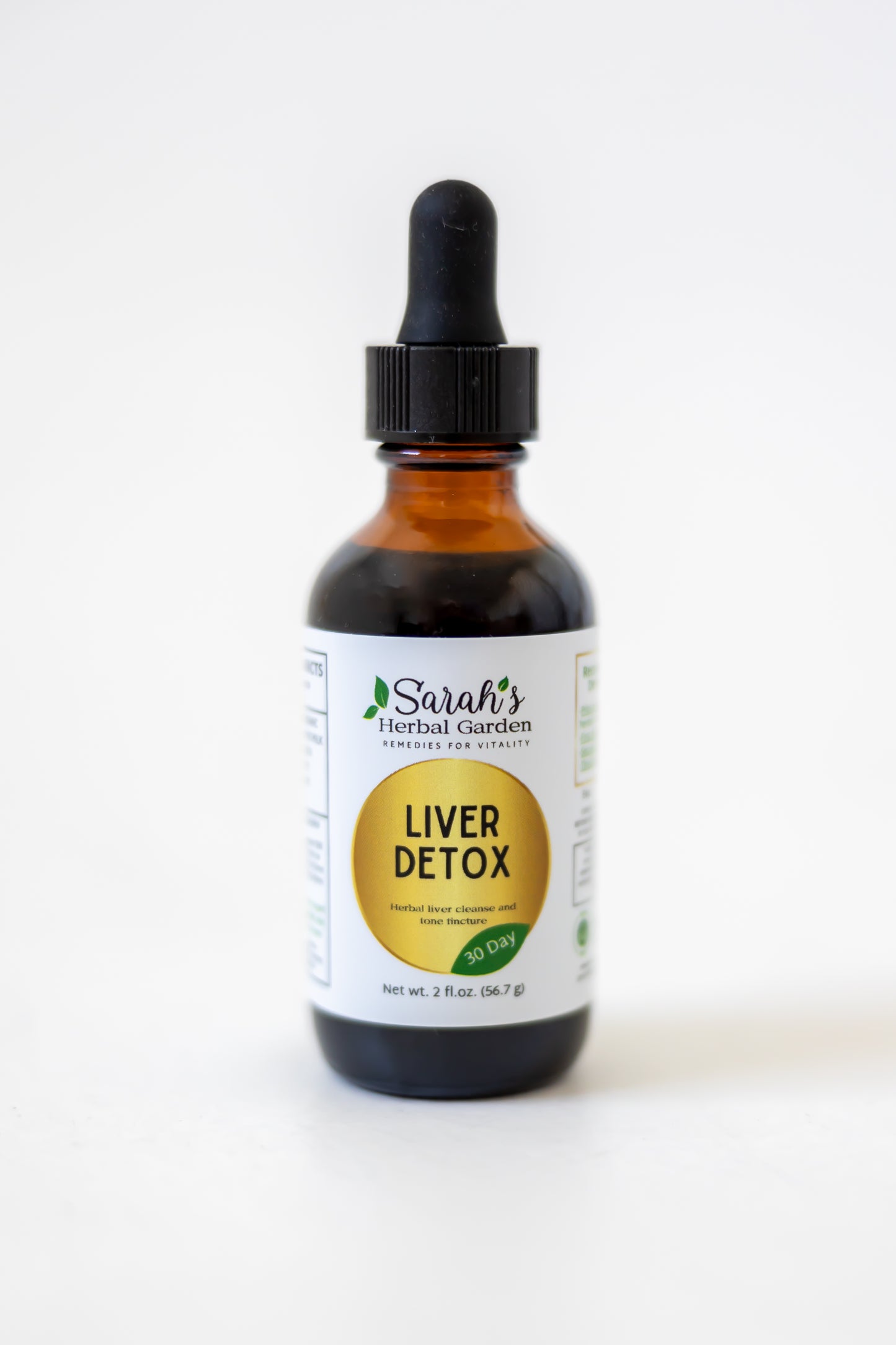
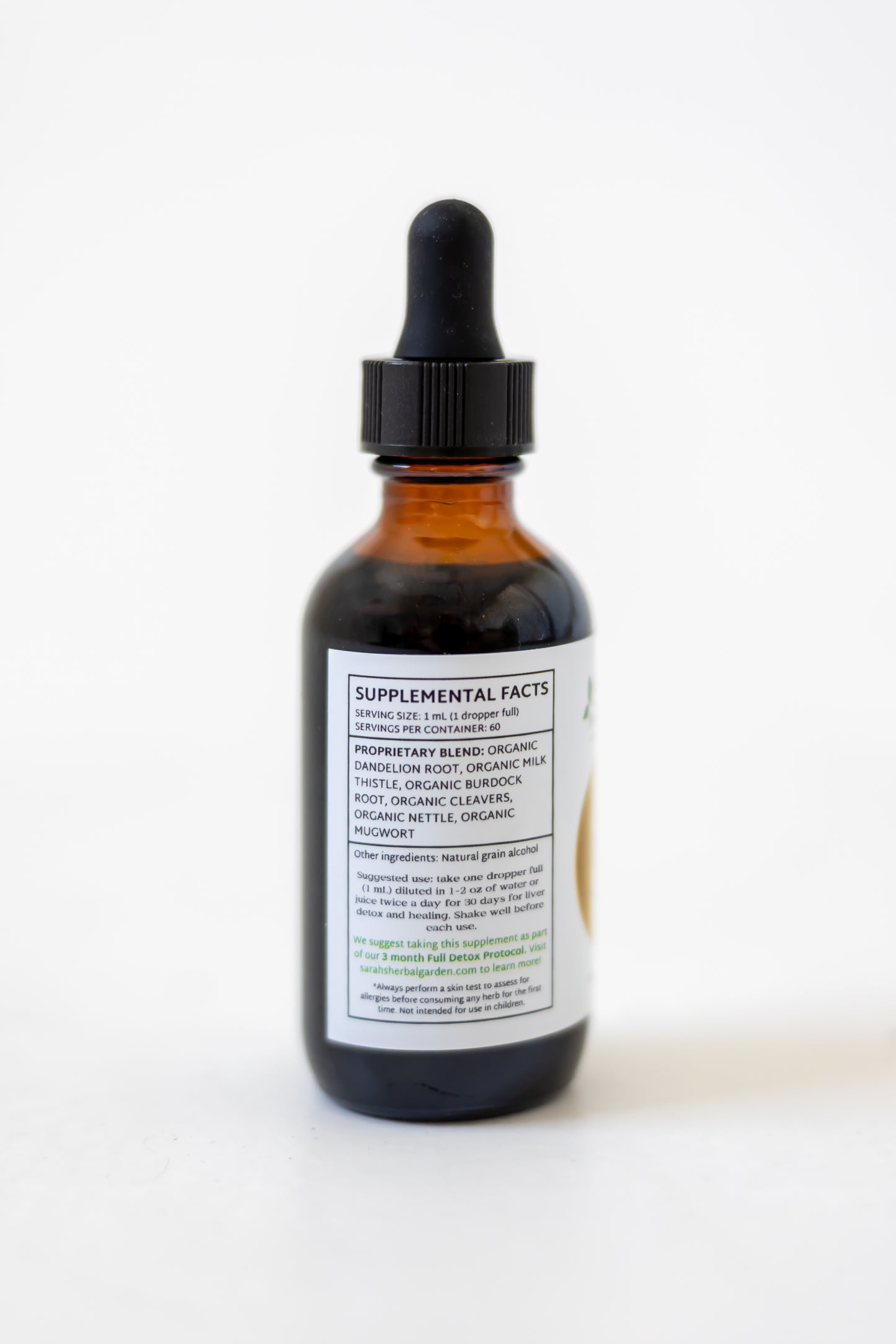
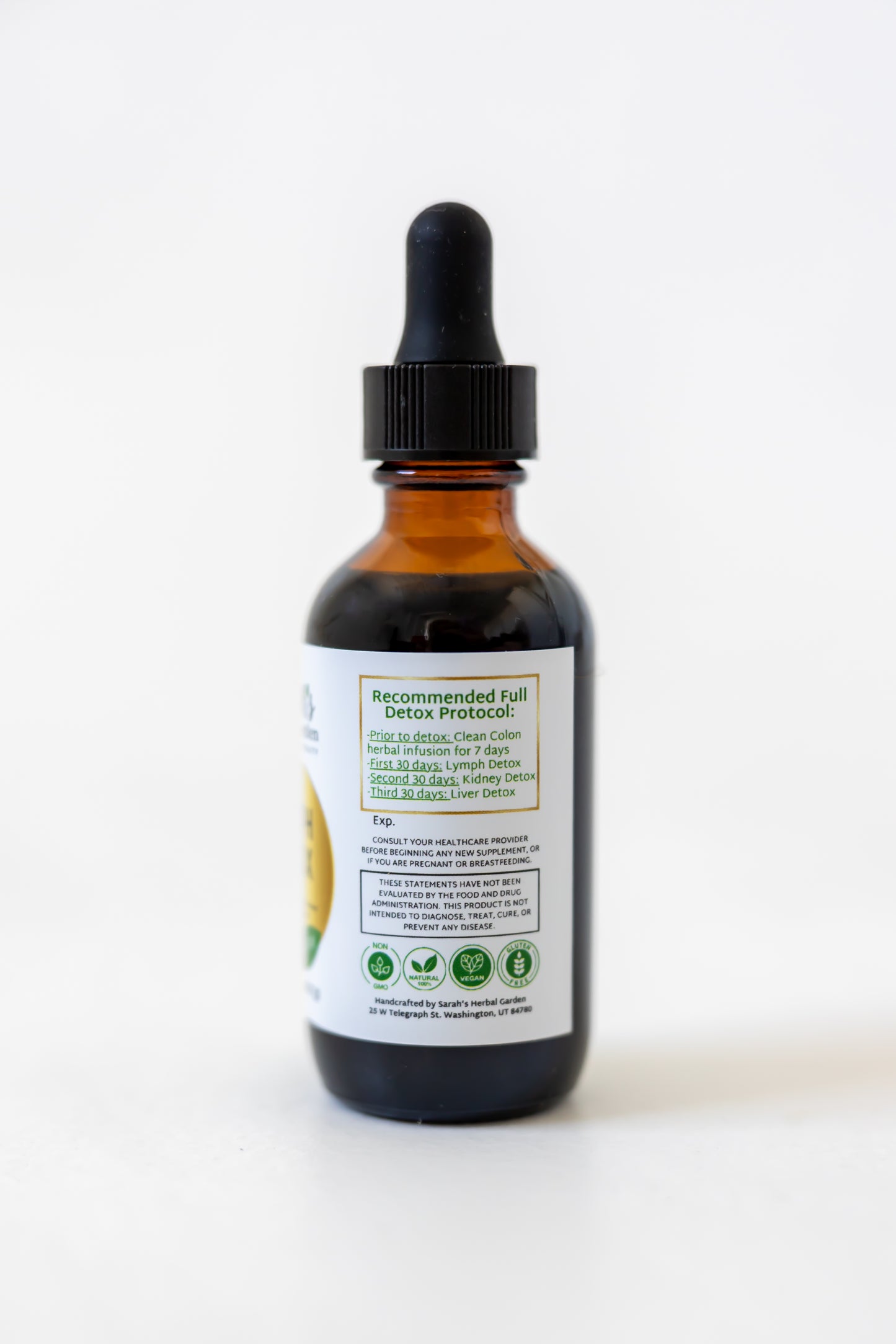
Herbs used in Clean Colon Herbal Tea Blend
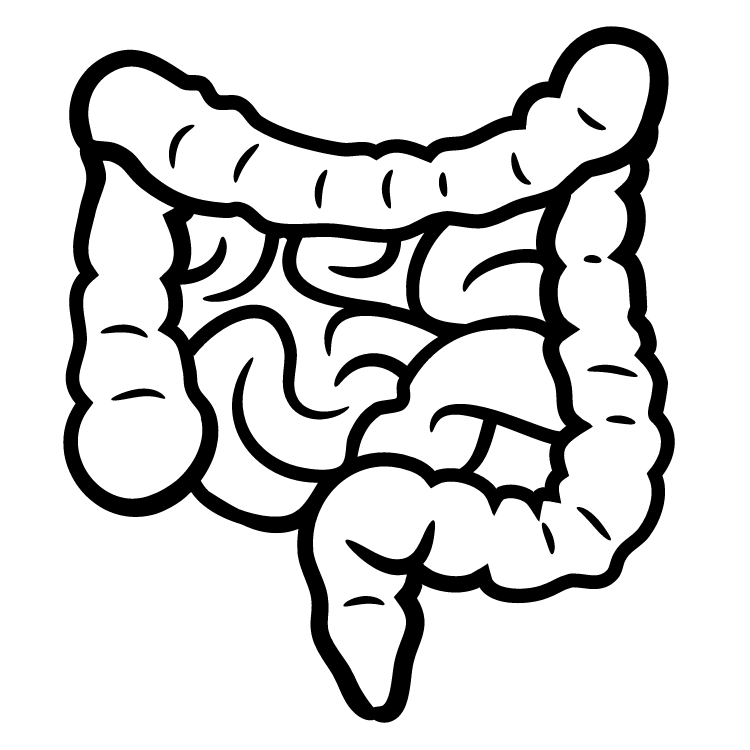
Yellow Dock
Yellow Dock contains anthraquinones, such as emodin and chrysophanol, which stimulate peristalsis (the contractions of the intestines). This helps to move waste material through the digestive tract more efficiently, preventing constipation and promoting regular bowel movements. Yellow Dock contains anthraquinones, such as emodin and chrysophanol, which stimulate peristalsis (the contractions of the intestines). This helps to move waste material through the digestive tract more efficiently, preventing constipation and promoting regular bowel movements. By supporting liver function and bile production, Yellow Dock aids in the detoxification process. The liver processes toxins, which are then excreted through the bile into the intestines for elimination. The tannins in Yellow Dock provide astringent properties that can reduce inflammation and irritation in the digestive tract. This can soothe the lining of the intestines, promoting a healthier and more effective colon. It is rich in minerals like iron, calcium, and magnesium, which support overall digestive health. A well-nourished digestive system functions more efficiently, aiding in the elimination of waste and promoting colon health.
Cascara Sagrada
Cascara Sagrada works in several ways to clean the colon:
Stimulant Laxative: Cascara sagrada contains anthraquinones, compounds that stimulate the muscles of the colon, causing them to contract more frequently and forcefully. This action helps move stool through the intestines and promotes bowel movements.
Softens Stool: By increasing the water content in the intestines, cascara sagrada helps to soften the stool, making it easier to pass and reducing the strain during bowel movements.
Improves Regularity: Regular use of cascara sagrada can help establish more consistent bowel movements, which is beneficial for those suffering from chronic constipation.
Detoxification: By promoting bowel movements, cascara sagrada helps remove waste and toxins from the colon, contributing to an overall detoxification process.
Supports Digestive Health: Clearing out accumulated waste in the colon can help improve the overall efficiency of the digestive system, reducing issues like bloating, gas, and discomfort.
Senna Leaf
Senna leaf, derived from the plant species Senna alexandrina, is a powerful natural laxative commonly used to aid in colon cleansing. Here's how it works and the benefits it provides:
Stimulant Laxative: Senna contains compounds called sennosides, which irritate the lining of the colon. This irritation stimulates the muscles of the colon to contract, leading to more frequent and forceful bowel movements.
Softens Stool: By promoting water and electrolyte secretion into the colon, senna helps to soften stool, making it easier to pass and reducing the strain during bowel movements.
Increases Peristalsis: The stimulation of the colon muscles enhances peristalsis (the wave-like muscle contractions that move food through the digestive tract), helping to move stool more efficiently through the intestines.
Detoxification: Regular bowel movements facilitated by senna can help eliminate waste and toxins from the colon, contributing to an overall detoxification process.
Short-Term Relief: Senna is effective for short-term relief of constipation.
Artichoke Leaf
Artichoke leaf has several properties to support digestion during a cleanse:
Stimulates Bile Production: Artichoke leaf extract stimulates the liver to produce more bile. Bile aids in the digestion and absorption of fats and helps to eliminate toxins from the liver. Increased bile production can enhance digestion and promote the efficient removal of waste from the intestines.
Digestive Aid: Artichoke leaf extract improves overall digestion by supporting the function of the digestive organs. Better digestion can lead to more regular bowel movements, which is essential for colon health.
Prebiotic Properties: Artichoke leaf is rich in inulin, a type of prebiotic fiber that promotes the growth of beneficial gut bacteria. A healthy gut microbiome supports efficient digestion and regular bowel movements.
Anti-inflammatory: The anti-inflammatory properties of artichoke leaf can help soothe the digestive tract, reducing inflammation that can contribute to digestive discomfort and irregularity.
Detoxification: By supporting liver function and bile production, artichoke leaf extract helps the body detoxify and remove harmful substances from the digestive system.
Marshmallow Root
Marshmallow root brings a highly beneficial presence to the colon cleansing process:
Soothing and Anti-inflammatory: Marshmallow root contains mucilage, a gel-like substance that coats and soothes the mucous membranes of the digestive tract. This can help reduce inflammation and irritation in the colon, making it beneficial for conditions like colitis and irritable bowel syndrome (IBS).
Laxative Effect: While not a stimulant laxative, marshmallow root can help promote regular bowel movements by adding bulk to the stool and softening it, making it easier to pass. This can help relieve constipation without the harsh effects of stronger laxatives.
Hydration and Lubrication: The mucilage in marshmallow root retains water, which helps to hydrate the stool and lubricate the intestines. This can facilitate smoother and more comfortable bowel movements.
Prebiotic Properties: Marshmallow root may support the growth of beneficial gut bacteria, which are crucial for a healthy digestive system. A balanced gut microbiome can improve digestion and support regular bowel movements.
Healing and Protective: The soothing properties of marshmallow root can help heal and protect the lining of the digestive tract. This is particularly useful for individuals with leaky gut syndrome or other gastrointestinal issues that involve damage to the gut lining.
Peppermint
Peppermint has been used in treating the digestive system since ancient times, and it's no wonder!
Digestive Aid: Peppermint leaf helps to relax the muscles of the gastrointestinal tract, promoting smoother and more efficient digestion. This can help alleviate symptoms of indigestion, bloating, and gas.
Antispasmodic Properties: The menthol in peppermint has antispasmodic effects, which can help reduce muscle spasms in the intestines. This is particularly beneficial for those with irritable bowel syndrome (IBS) and can help prevent cramping and discomfort during bowel movements.
Anti-inflammatory: Peppermint has anti-inflammatory properties that can help reduce inflammation in the digestive tract, making it beneficial for conditions like colitis and other inflammatory bowel diseases.
Improves Bile Flow: Peppermint leaf stimulates the flow of bile, which is essential for the digestion of fats. Enhanced bile flow can improve digestion and promote the efficient elimination of waste from the intestines.
Relieves Gas and Bloating: Peppermint leaf helps to expel gas from the intestines, reducing bloating and discomfort. This can be particularly helpful after meals or for individuals prone to digestive discomfort.
Antimicrobial: Peppermint has natural antimicrobial properties that can help reduce harmful bacteria in the gut, promoting a healthier gut microbiome and preventing infections that could disrupt digestion.
Herbs Used in Lymph Detox Formula

Cleavers
Cleavers (Galium aparine) is a herb traditionally used in herbal medicine for its potential benefits in cleansing and supporting the lymphatic system. The lymphatic system is a crucial part of the immune system, responsible for transporting lymph, a fluid containing white blood cells, throughout the body to help fight infection and remove waste products.
Here's how cleavers help to cleanse the lymphatic system:
1. Lymphatic Stimulant
- Cleavers are considered a lymphatic stimulant, meaning they can help promote the movement of lymph through the lymphatic vessels. This can assist in reducing lymphatic congestion and ensuring that waste products and toxins are efficiently removed from the body.
2. Diuretic Properties
- Cleavers have mild diuretic properties, which means they can increase urine production. This helps in flushing out toxins from the body, including those processed by the lymphatic system. By promoting the excretion of excess fluids and waste, cleavers can help reduce swelling and edema often associated with lymphatic issues.
3. Anti-inflammatory Effects
- Cleavers has anti-inflammatory properties, which can be beneficial in reducing inflammation in the lymphatic system. Inflammation can impede lymph flow, so reducing it can help improve the overall function of the lymphatic system.
4. Detoxification Support
- Cleavers are used in this detox protocol because they support the body's natural detox processes. By enhancing lymphatic flow and promoting the removal of waste products, cleavers can help the body eliminate toxins more effectively, thus supporting overall health and well-being.
5. Immune System Support
- Since the lymphatic system is closely tied to the immune system, improving lymphatic function with herbs like cleavers may also support immune health. By helping to maintain a healthy lymphatic system, cleavers can aid in the proper functioning of the immune system, which relies on the lymphatic system to transport immune cells throughout the body.
6. Clearing Skin Conditions
- Cleavers can help clear skin conditions like acne, psoriasis, and eczema, which can be related to a sluggish lymphatic system. By promoting lymphatic drainage, cleavers may help to clear these conditions from the inside out.
Red Clover
Red clover (Trifolium pratense) is a herb traditionally used for its potential benefits in supporting the lymphatic system and promoting detoxification. Here's how red clover helps to detox the lymphatic system:
1. Lymphatic Stimulant
- Red clover is considered a lymphatic tonic, meaning it helps stimulate the lymphatic system's function. This stimulation can encourage the movement of lymph fluid, helping to clear out waste products, toxins, and other unwanted substances from the lymphatic system and, subsequently, from the body.
2. Blood Purification
- Red clover is known for its blood-cleansing properties. By promoting the elimination of toxins and waste products from the blood, it indirectly supports the lymphatic system, which works closely with the circulatory system to maintain fluid balance and remove waste.
3. Diuretic Effects
- Red clover has mild diuretic properties, which means it can help increase urine production. This can assist the body in flushing out toxins and waste products, including those processed by the lymphatic system, thus reducing the burden on the lymphatic system.
4. Anti-inflammatory Properties
- Red clover contains compounds that have anti-inflammatory effects. By reducing inflammation in the lymph nodes and lymphatic vessels, red clover may help improve lymph flow and prevent the stagnation of lymph fluid, which can lead to issues like swelling or lymphedema.
5. Rich in Nutrients and Antioxidants
- Red clover is a rich source of vitamins, minerals, and antioxidants, such as flavonoids, which can help protect the body’s cells from oxidative stress. Antioxidants play a role in neutralizing harmful free radicals, reducing the toxic load on the lymphatic system, and supporting overall detoxification.
6. Support for Skin Conditions
- Red clover is often used to help with skin conditions like eczema, psoriasis, and acne, which can be signs of a sluggish lymphatic system. By improving lymphatic drainage and detoxification, red clover may help clear these skin conditions from within, promoting clearer and healthier skin.
7. Immune System Support
- The lymphatic system is closely tied to the immune system. By supporting the lymphatic system, red clover can help boost immune function, making it easier for the body to fend off infections and other health issues.
Echinacea
Echinacea, a well-known herb traditionally used for its immune-boosting properties, also plays a role in supporting the lymphatic system and detoxification. Here's how echinacea can help detox the lymphatic system:
1. Lymphatic Stimulant
- Echinacea is considered a lymphatic stimulant, meaning it helps to promote the movement of lymph fluid throughout the lymphatic vessels. This stimulation helps to clear out toxins, waste products, and other unwanted substances that accumulate in the lymphatic system, preventing stagnation and congestion.
2. Immune System Support
- Echinacea is widely recognized for its immune-enhancing properties. By boosting the immune system, echinacea helps the body fight off infections and reduce the overall burden on the lymphatic system, which plays a key role in the body’s immune response by filtering harmful pathogens and foreign particles from the lymph fluid.
3. Anti-inflammatory Effects
- Echinacea contains active compounds that have anti-inflammatory effects, which can help reduce inflammation in the lymphatic system. Inflammation in the lymph nodes and vessels can lead to swelling and impaired lymphatic function, so reducing inflammation supports better lymph flow and detoxification.
4. Antimicrobial Properties
- Echinacea has natural antimicrobial properties, which help to fight off bacterial, viral, and fungal infections. By reducing the load of harmful microorganisms in the body, echinacea aids the lymphatic system in its role of filtering and eliminating pathogens, thus supporting overall detoxification.
5. Encourages Lymphatic Drainage
- By promoting the drainage of lymph fluid, echinacea can help prevent the buildup of toxins and waste products that might otherwise lead to conditions like lymphedema (swelling due to lymphatic fluid retention). Improved lymphatic drainage supports the body’s natural detoxification processes.
6. Blood Purification
- Echinacea has been traditionally used as a blood purifier. By helping to cleanse the blood of toxins and waste products, echinacea indirectly supports the lymphatic system, which works in tandem with the circulatory system to maintain fluid balance and detoxify the body.
7. Enhances Healing and Recovery
- Echinacea is often used to speed up the healing process after infections or injuries. By supporting the immune system and enhancing lymphatic function, echinacea helps the body more efficiently clear out cellular debris and toxins that accumulate during the healing process.
Astragalus
Astragalus (Astragalus membranaceus) is a traditional herb used in Chinese medicine, primarily known for its immune-boosting and adaptogenic properties. It also has benefits that can support the lymphatic system and aid in detoxification. Here's how astragalus can help detox the lymphatic system:
1. Immune System Support
- Astragalus is well-regarded for its ability to strengthen the immune system. A robust immune system helps the lymphatic system function more effectively by filtering out pathogens, toxins, and waste products from the lymph fluid. By enhancing immune response, astragalus reduces the burden on the lymphatic system and promotes overall detoxification.
2. Anti-inflammatory Properties
- Astragalus has anti-inflammatory effects, which can help reduce inflammation within the lymphatic system. Inflammation can lead to swollen lymph nodes and impaired lymph flow, so reducing inflammation with astragalus supports better lymphatic drainage and detoxification.
3. Adaptogenic Qualities
- As an adaptogen, astragalus helps the body adapt to stress and maintain balance. Chronic stress can negatively impact the lymphatic system by weakening the immune response and contributing to inflammation. Astragalus helps mitigate these effects, supporting overall lymphatic health and function.
4. Lymphatic Stimulant
- Although not as strong a lymphatic stimulant as some other herbs, astragalus can still encourage the movement of lymph fluid. This mild stimulation helps the lymphatic system clear out waste products and toxins more efficiently, reducing the likelihood of lymphatic congestion.
5. Detoxification Support
- Astragalus supports the body's natural detoxification processes by enhancing the function of the liver, kidneys, and spleen. These organs are crucial for filtering and eliminating toxins, and their improved function indirectly supports the lymphatic system in its role of managing and transporting waste products.
6. Antioxidant Properties
- Astragalus contains antioxidants, which help protect the body's cells from oxidative stress and damage caused by free radicals. By reducing oxidative stress, astragalus lowers the overall toxic burden on the body, supporting the lymphatic system's role in detoxification.
7. Enhancing Cellular Repair
- Astragalus is known for its ability to support cellular repair and regeneration. By promoting the health of cells, including those in the lymphatic system, astragalus helps ensure that the lymphatic system remains effective at filtering and removing toxins.
Burdock Root
Burdock root (Arctium lappa) is a traditional herb widely recognized for its detoxifying properties, particularly in relation to the lymphatic system. Here’s how burdock root can help detox the lymphatic system:
1. Lymphatic Stimulant
- Burdock root is considered a lymphatic tonic, meaning it helps stimulate the lymphatic system and promotes the movement of lymph fluid throughout the body. By enhancing lymph flow, burdock root assists in clearing out toxins, waste products, and other harmful substances from the lymphatic system, helping to prevent stagnation and congestion.
2. Blood Purification
- One of the primary uses of burdock root in herbal medicine is as a blood purifier. By helping to detoxify the blood, burdock root reduces the load of toxins that the lymphatic system needs to process. This cleansing action indirectly supports the lymphatic system by ensuring that the blood is cleaner, which reduces the overall burden on the lymph nodes.
3. Diuretic Properties
- Burdock root has natural diuretic properties, which means it increases urine production. This helps the body flush out toxins more efficiently through the kidneys. By promoting the elimination of excess fluids and waste, burdock root can help reduce swelling and edema, which are often associated with lymphatic congestion.
4. Anti-inflammatory Effects
- Burdock root contains anti-inflammatory compounds that can help reduce inflammation in the lymphatic system. Inflammation can impede lymph flow and lead to swollen lymph nodes, so reducing it helps maintain healthy lymphatic function and promotes the detoxification process.
5. Antioxidant Properties
- Burdock root is rich in antioxidants, such as quercetin, luteolin, and phenolic acids. These antioxidants help protect cells from oxidative stress and damage caused by free radicals. By reducing oxidative stress, burdock root helps lower the toxic burden on the lymphatic system and supports overall detoxification.
6. Support for Skin Health
- Burdock root is often used to treat skin conditions like acne, eczema, and psoriasis, which can be related to a sluggish lymphatic system. By supporting lymphatic drainage and detoxification, burdock root may help clear up skin conditions from the inside out, promoting healthier skin.
7. Immune System Support
- The lymphatic system plays a crucial role in the immune response by filtering out pathogens and foreign particles. Burdock root supports the immune system, which in turn helps the lymphatic system function more effectively in clearing out these harmful substances.
Usage:
Herbs used in Kidney Detox Formula
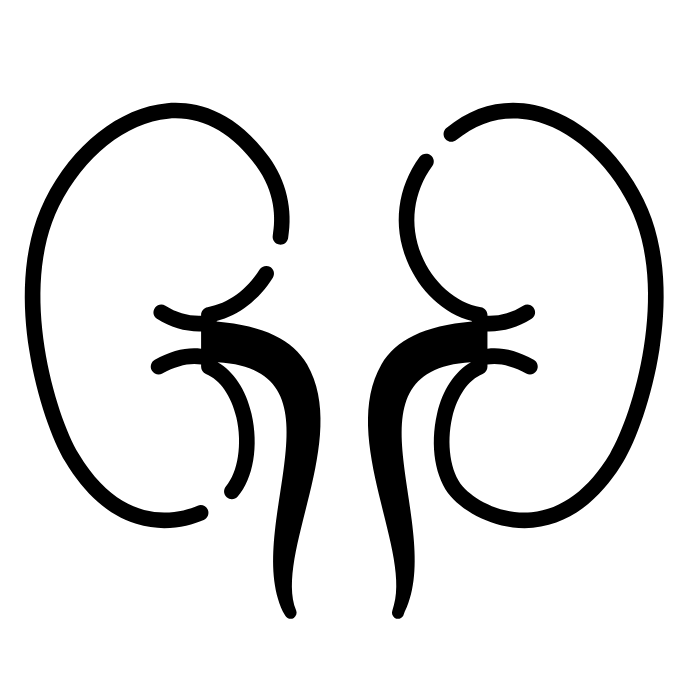
Dandelion
Dandelion root (Taraxacum officinale) is a well-known herbal remedy that has been traditionally used to support kidney health and detoxification. Here's how dandelion root helps detox the kidneys:
1. Diuretic Properties
- Promotes Urine Production: Dandelion root is a natural diuretic, meaning it increases urine production. This helps the kidneys flush out toxins, waste products, and excess fluids more effectively, reducing the burden on the kidneys and supporting their natural detoxification processes. The increased urine flow helps to cleanse the kidneys and urinary tract by preventing the buildup of waste products and reducing the risk of kidney stones and infections.
2. Rich in Potassium
- Supports Electrolyte Balance: Dandelion root contains high levels of potassium, an essential mineral that helps balance electrolytes in the body. While dandelion root promotes the excretion of excess fluids, its potassium content helps replenish this vital mineral, ensuring that electrolyte levels remain balanced and supporting overall kidney function.
3. Anti-inflammatory Effects
- Reduces Inflammation in the Kidneys: Dandelion root has anti-inflammatory properties that can help reduce inflammation in the kidneys and urinary tract. Chronic inflammation can impair kidney function, so reducing it with dandelion root supports healthier kidneys and improves their ability to filter and eliminate toxins.
4. Antioxidant Properties
- Protects Kidney Cells from Damage: Dandelion root is rich in antioxidants, such as flavonoids, phenolic acids, and vitamin C, which help protect kidney cells from oxidative stress and damage caused by free radicals. By reducing oxidative stress, dandelion root supports the overall health and function of the kidneys, helping them to detoxify the body more effectively.
5. Detoxification Support
- Enhances Liver Function: The liver and kidneys work together to detoxify the body. Dandelion root is also known to support liver function, enhancing the liver’s ability to process and eliminate toxins from the blood. By improving liver function, dandelion root indirectly supports kidney detoxification, as the liver and kidneys share the workload of filtering and excreting waste.
6. Promotes Kidney Health
- Prevents Kidney Stones and Infections: By promoting increased urine flow and reducing inflammation, dandelion root can help prevent the formation of kidney stones and urinary tract infections, which can impair kidney function. Its diuretic effect helps to dilute urine and prevent the crystallization of minerals that can lead to stone formation.
7. Blood Pressure Regulation
- Supports Cardiovascular Health: The kidneys play a crucial role in regulating blood pressure by managing fluid balance and sodium levels in the body. By acting as a diuretic and supporting kidney function, dandelion root can help reduce fluid retention, lower blood pressure, and support cardiovascular health, which is closely linked to kidney health.
Nettle
Nettle (Urtica dioica), commonly known as stinging nettle, is a herb traditionally used for various health benefits, including supporting kidney function and detoxification. Here's how nettle helps detox the kidneys:
1. Diuretic Properties
- Promotes Urine Production: Nettle is a natural diuretic, meaning it increases urine production. By promoting urination, nettle helps the kidneys flush out toxins, waste products, and excess fluids more effectively. This process aids in cleansing the kidneys and the urinary tract, reducing the risk of kidney stones, urinary tract infections, and other kidney-related issues.
2. Anti-inflammatory Effects
- Reduces Inflammation in the Kidneys: Nettle has potent anti-inflammatory properties, which can help reduce inflammation in the kidneys and urinary tract. Chronic inflammation can impair kidney function and lead to conditions such as nephritis. By reducing inflammation, nettle supports the health and efficiency of the kidneys, allowing them to perform their detoxification role more effectively.
3. Rich in Nutrients
- Supports Kidney Health: Nettle is rich in vitamins (such as A, C, and K) and minerals (such as iron, calcium, magnesium, and potassium) that are essential for maintaining overall health, including kidney function. The potassium content in nettle helps balance electrolytes, which is crucial when using diuretics to ensure that the body maintains proper fluid and electrolyte balance.
4. Antioxidant Properties
- Protects Kidney Cells from Damage: Nettle contains various antioxidants, including flavonoids, carotenoids, and polyphenols, which help protect kidney cells from oxidative stress and damage caused by free radicals. By neutralizing free radicals, nettle reduces oxidative damage to the kidneys, supporting their long-term health and function.
5. Supports Circulatory Health
- Enhances Blood Flow to the Kidneys: Nettle is known to improve circulation, which can enhance blood flow to the kidneys. Better blood flow ensures that the kidneys receive the oxygen and nutrients they need to function properly and effectively filter and eliminate toxins from the body.
6. Prevents and Treats Kidney Stones
- Reduces the Risk of Stone Formation: The diuretic effect of nettle helps prevent the formation of kidney stones by diluting urine and preventing the crystallization of minerals, such as calcium oxalate, that can lead to stone formation. Additionally, nettle’s anti-inflammatory and antioxidant properties may help reduce the likelihood of kidney stone formation and alleviate symptoms if stones are present.
7. Detoxification Support
- Enhances Kidney Detoxification Processes: By supporting the kidneys' natural ability to filter and excrete waste, nettle helps detoxify the body. This includes assisting the kidneys in removing metabolic waste, environmental toxins, and excess substances such as urea and creatinine, which can build up in the blood if kidney function is impaired.
8. Alleviates Symptoms of Urinary Tract Infections
- Soothes and Cleanses the Urinary Tract: Nettle's diuretic and anti-inflammatory properties can help soothe and cleanse the urinary tract, reducing symptoms of urinary tract infections (UTIs). By promoting urine flow, nettle helps flush out bacteria and other pathogens that can cause infections, indirectly supporting kidney health.
Cleavers
Cleavers (Galium aparine), a herb traditionally used in herbal medicine, is known for its role in detoxifying the lymphatic system and supporting kidney health. Here's how cleavers help detox the kidneys:
1. Diuretic Properties
- Increases Urine Production: Cleavers are a natural diuretic, meaning they promote increased urine flow. This diuretic action helps the kidneys flush out toxins, waste products, and excess fluids more efficiently. By encouraging more frequent urination, cleavers help cleanse the kidneys and the urinary tract, reducing the risk of urinary tract infections and kidney stones.
2. Lymphatic System Support
- Aids in Waste Removal: Cleavers are known for their ability to stimulate the lymphatic system, which plays a key role in filtering and removing waste products from the body. By supporting the lymphatic system, cleavers help reduce the overall burden on the kidneys, as the lymphatic and urinary systems work together to eliminate toxins from the body.
3. Anti-inflammatory Effects
- Reduces Inflammation in the Kidneys: Cleavers possess anti-inflammatory properties that can help reduce inflammation in the kidneys and urinary tract. Inflammation can impair kidney function and lead to conditions such as nephritis. By reducing inflammation, cleavers support healthy kidney function and aid in the detoxification process.
4. Mild Diuretic without Depleting Electrolytes
- Maintains Electrolyte Balance: Unlike some stronger diuretics that can cause significant electrolyte imbalances, cleavers provide a gentler diuretic effect that helps maintain electrolyte balance while promoting kidney detoxification. This makes cleavers a safer option for supporting kidney health without causing dehydration or significant loss of essential minerals.
5. Soothing Effect on the Urinary Tract
- Helps Alleviate Irritation: Cleavers have a soothing effect on the urinary tract, which can help alleviate irritation and inflammation that might occur during the detoxification process. This soothing property is particularly beneficial for individuals experiencing symptoms of urinary tract infections or other urinary issues.
6. Blood Purification
- Supports Overall Detoxification: Cleavers are known as a blood purifier, helping to cleanse the blood of toxins and waste products. By improving blood quality, cleavers indirectly support kidney function, as cleaner blood reduces the workload on the kidneys and enhances their ability to filter and remove toxins.
7. Prevention of Kidney Stones
- Reduces the Risk of Stone Formation: The increased urine flow promoted by cleavers helps dilute the urine, reducing the concentration of minerals that can crystallize and form kidney stones. Regular use of cleavers may help prevent the formation of kidney stones by keeping the urinary tract flushed and free of stagnant fluids.
Saw Palmetto
Here's how saw palmetto might help support kidney health and detoxification:
1. Supports Prostate Health
- Reduces Urinary Tract Obstruction: Saw palmetto is well-known for its ability to reduce symptoms of benign prostatic hyperplasia (BPH), a condition where the prostate gland enlarges and presses against the urethra. This can lead to urinary retention and increased strain on the kidneys. By reducing prostate enlargement and improving urinary flow, saw palmetto helps alleviate pressure on the urinary tract, indirectly supporting kidney function and reducing the risk of complications like urinary tract infections or kidney stones.
2. Anti-inflammatory Properties
- Reduces Inflammation in the Urinary Tract: Saw palmetto has anti-inflammatory properties that can help reduce inflammation in the urinary tract, including the kidneys. Inflammation can impair kidney function and lead to various issues, so reducing it can help maintain healthy kidney function.
3. Diuretic Effects
- Promotes Urine Flow: Although saw palmetto is not a strong diuretic, it can have mild diuretic effects, which help promote urine flow. Improved urine flow can help the kidneys flush out toxins and waste products more effectively, supporting the body's natural detoxification processes.
4. Hormonal Balance
- Supports Hormonal Regulation: Saw palmetto is known for its ability to modulate hormonal balance, particularly testosterone and dihydrotestosterone (DHT). While this effect is more relevant to prostate health, maintaining hormonal balance can also indirectly support overall health, including kidney function, by reducing the risk of hormone-related issues that might affect the kidneys or urinary system.
5. Prevents Urinary Retention
- Reduces Strain on the Kidneys: By improving urinary flow and reducing urinary retention, saw palmetto helps prevent the buildup of urine in the bladder. This reduces the strain on the kidneys, as they do not have to work as hard to filter out waste products from the blood when the urinary tract is functioning optimally.
Parsley Root
Parsley root (Petroselinum crispum var. tuberosum) is a herb traditionally used for its medicinal properties, particularly in supporting kidney health and detoxification. Here's how parsley root helps detox the kidneys:
1. Diuretic Properties
- Promotes Urine Production: Parsley root is a natural diuretic, which means it increases urine production. This helps the kidneys flush out toxins, waste products, and excess fluids more effectively. By promoting frequent urination, parsley root helps cleanse the kidneys and urinary tract, reducing the risk of urinary tract infections (UTIs) and kidney stones.
2. Reduces Kidney Stone Formation
- Prevents Stone Formation: The diuretic effect of parsley root helps prevent the buildup of minerals and salts that can lead to the formation of kidney stones. By increasing urine output, parsley root reduces the concentration of these substances in the urine, thereby lowering the risk of kidney stone formation.
3. Anti-inflammatory Effects
- Reduces Inflammation in the Kidneys: Parsley root has anti-inflammatory properties that can help reduce inflammation in the kidneys and urinary tract. Inflammation can impair kidney function and contribute to conditions such as nephritis (inflammation of the kidneys). By reducing inflammation, parsley root supports healthy kidney function and enhances detoxification.
4. Antioxidant Properties
- Protects Kidney Cells from Damage: Parsley root is rich in antioxidants, such as flavonoids, vitamin C, and carotenoids, which help protect kidney cells from oxidative stress and damage caused by free radicals. By reducing oxidative stress, parsley root helps maintain healthy kidney function and supports the kidneys' role in detoxification.
5. Supports Electrolyte Balance
- Maintains Electrolyte Levels: As a diuretic, parsley root promotes the excretion of fluids, but it also helps maintain a balance of electrolytes, particularly potassium. This is important because excessive diuresis can lead to a loss of vital minerals, which could negatively impact kidney function. Parsley root’s potassium content helps offset this effect, ensuring that electrolyte levels remain balanced.
6. Cleanses the Urinary Tract
- Flushes Out Toxins: By increasing urine flow, parsley root helps flush out toxins, bacteria, and other waste products from the urinary tract. This cleansing action helps prevent infections and supports overall urinary tract health, indirectly benefiting the kidneys by reducing the risk of conditions that could strain kidney function.
7. Liver Support
- Enhances Overall Detoxification: The kidneys and liver work together to detoxify the body. Parsley root supports liver health by promoting detoxification processes, which can indirectly benefit kidney function. A healthy liver can better process toxins, reducing the burden on the kidneys.
8. Blood Pressure Regulation
- Supports Cardiovascular Health: The kidneys play a crucial role in regulating blood pressure by managing fluid balance and sodium levels. Parsley root's diuretic properties can help lower blood pressure by reducing fluid retention, which supports both kidney and cardiovascular health.
Herbs Used in Liver Detox Formula

Dandelion Root
Dandelion root (Taraxacum officinale) is widely recognized for its liver-supporting and detoxifying properties. It has been used in traditional medicine for centuries to promote liver health and aid in detoxification. Here’s how dandelion root helps detox the liver:
1. Stimulates Bile Production
- Enhances Liver Function: Dandelion root stimulates the production and flow of bile, a fluid produced by the liver that aids in digestion, particularly the breakdown and absorption of fats. Increased bile production helps the liver efficiently process and eliminate toxins, including those derived from fatty substances. This cleansing action supports overall liver function and promotes detoxification.
2. Diuretic Properties
- Aids in Toxin Elimination: Dandelion root acts as a natural diuretic, increasing urine production. This helps the liver and kidneys work together to remove toxins from the body more efficiently. By promoting the elimination of excess fluids and waste products, dandelion root reduces the liver's workload and supports the detoxification process.
3. Rich in Antioxidants
- Protects Liver Cells from Damage: Dandelion root contains various antioxidants, including flavonoids, vitamin C, and beta-carotene, which protect liver cells from oxidative stress and damage caused by free radicals. These antioxidants help neutralize harmful substances that can accumulate in the liver, reducing the risk of liver damage and supporting overall liver health.
4. Anti-inflammatory Effects
- Reduces Liver Inflammation: Chronic inflammation in the liver can impair its function and lead to conditions like fatty liver disease, hepatitis, or cirrhosis. Dandelion root has anti-inflammatory properties that help reduce inflammation in the liver, promoting healing and improving liver function.
5. Promotes Liver Regeneration
- Supports Liver Tissue Repair: Dandelion root has been shown to support the regeneration of liver tissue. By enhancing the liver's ability to repair itself, dandelion root helps maintain optimal liver function and aids in the recovery from liver-related conditions.
6. Liver Detoxification Support
- Enhances Phase I and II Detoxification: The liver detoxifies harmful substances through two main phases: Phase I and Phase II detoxification. Dandelion root supports both phases by providing nutrients and compounds that enhance the liver's enzymatic processes, helping the liver break down and eliminate toxins more effectively.
7. Improves Digestion
- Aids in Waste Elimination: Dandelion root’s ability to stimulate bile production also supports digestion and the elimination of waste. Improved digestion and waste elimination reduce the toxic load on the liver, allowing it to focus on detoxification processes rather than dealing with undigested food or metabolic waste.
8. Blood Purification
- Reduces the Liver’s Toxin Load: Dandelion root has traditionally been used as a blood purifier. By helping to cleanse the blood of toxins and waste products, it reduces the liver's burden and enhances its ability to filter and detoxify the blood effectively.
9. Prevents Liver Fat Accumulation
- Protects Against Fatty Liver: Dandelion root may help prevent the accumulation of fat in the liver, a condition known as fatty liver disease. By promoting fat metabolism and reducing fat storage in liver cells, dandelion root supports a healthier liver and enhances its detoxification capacity.
Nettle
Nettle (Urtica dioica), commonly known as stinging nettle, is a nutrient-rich herb traditionally used for various health benefits, including detoxification and supporting liver health. Here's how nettle helps detox the liver:
1. Antioxidant Properties
- Protects Liver Cells from Damage: Nettle is rich in antioxidants, including flavonoids, vitamin C, and carotenoids, which help protect liver cells from oxidative stress and damage caused by free radicals. By neutralizing free radicals, nettle reduces the risk of liver damage and supports the liver’s ability to detoxify the body effectively.
2. Anti-inflammatory Effects
- Reduces Liver Inflammation: Chronic inflammation can impair liver function and lead to conditions like fatty liver disease, hepatitis, or cirrhosis. Nettle has potent anti-inflammatory properties that can help reduce inflammation in the liver, promoting healing and improving liver function. By mitigating inflammation, nettle supports the liver’s detoxification processes.
3. Diuretic Properties
- Promotes Toxin Elimination: Nettle acts as a natural diuretic, increasing urine production and helping the body eliminate toxins and waste products through the urinary system. This diuretic effect indirectly supports liver detoxification by reducing the burden on the liver and aiding in the excretion of toxins that the liver processes.
4. Blood Purification
- Supports Overall Detoxification: Nettle has traditionally been used as a blood purifier, meaning it helps cleanse the blood of toxins and waste products. Since the liver is responsible for filtering and detoxifying the blood, nettle’s blood-cleansing properties reduce the toxic load on the liver, allowing it to function more efficiently.
5. Nutrient-Rich Support
- Provides Essential Nutrients for Liver Health: Nettle is rich in vitamins and minerals, such as iron, magnesium, calcium, and potassium, which are essential for overall health and well-being. These nutrients support liver function by ensuring that the liver has the necessary resources to carry out its detoxification processes. For instance, iron is crucial for the production of hemoglobin, which transports oxygen in the blood and supports liver health.
6. Supports Liver Regeneration
- Aids in Liver Tissue Repair: The liver has a remarkable ability to regenerate itself, and nettle can support this process by providing nutrients and reducing inflammation. By promoting the repair and regeneration of liver tissue, nettle helps maintain optimal liver function and supports the liver’s detoxification capacity.
7. Enhances Bile Production
- Supports Digestion and Waste Elimination: Nettle may help stimulate the production of bile, a substance produced by the liver that aids in digestion and the elimination of waste products. Improved bile flow helps the liver process and remove toxins more effectively, supporting overall detoxification.
8. Immune System Support
- Boosts Immunity and Liver Function: Nettle has immune-boosting properties, which can help the liver fight off infections and reduce the risk of liver-related illnesses. A strong immune system supports the liver in its role as a filter for pathogens and toxins, enhancing its detoxification capabilities.
Milk Thistle
Milk thistle (Silybum marianum) is one of the most well-known herbs for liver detoxification and has been used for centuries in traditional medicine to support liver health. The active compound in milk thistle, known as silymarin, is primarily responsible for its liver-protective and detoxifying effects. Here's how milk thistle helps detox the liver:
1. Antioxidant Properties
- Protects Liver Cells from Oxidative Stress: Milk thistle is rich in silymarin, a potent antioxidant that helps protect liver cells (hepatocytes) from damage caused by free radicals and oxidative stress. This protection is crucial because the liver is constantly exposed to toxins and byproducts of metabolism that can cause oxidative damage. By neutralizing these harmful free radicals, milk thistle helps prevent liver cell damage and supports overall liver health.
2. Promotes Liver Cell Regeneration
- Supports Liver Repair and Regrowth: One of the unique properties of silymarin is its ability to promote the regeneration of liver cells. This is particularly important because the liver has the ability to repair itself after injury or damage. Silymarin stimulates protein synthesis in the liver, helping to regenerate damaged liver tissue and maintain healthy liver function. This regenerative effect is especially beneficial for individuals with liver conditions such as hepatitis, cirrhosis, or fatty liver disease.
3. Anti-inflammatory Effects
- Reduces Liver Inflammation: Chronic inflammation in the liver can lead to conditions such as hepatitis, cirrhosis, and liver fibrosis. Silymarin in milk thistle has strong anti-inflammatory properties that help reduce inflammation in the liver, promoting healing and preventing further damage. By reducing inflammation, milk thistle helps to protect the liver and enhance its detoxification capacity.
4. Enhances Detoxification Enzyme Activity
- Supports Phase I and II Detoxification: The liver detoxifies harmful substances through two main phases: Phase I and Phase II detoxification. Silymarin enhances the activity of detoxification enzymes involved in these phases, helping the liver to more efficiently process and eliminate toxins. This includes the breakdown of toxins, drugs, and other harmful substances, making them easier for the body to eliminate.
5. Stabilizes Liver Cell Membranes
- Prevents Toxin Penetration into Liver Cells: Silymarin helps stabilize the membranes of liver cells, making it more difficult for toxins to penetrate and cause damage. This membrane-stabilizing effect is crucial for protecting the liver from the harmful effects of various toxins, including alcohol, environmental pollutants, and medications.
6. Chelation of Heavy Metals
- Helps Remove Heavy Metals from the Liver: Milk thistle has been shown to have chelating properties, meaning it can bind to heavy metals like lead and cadmium and facilitate their removal from the liver. This helps reduce the toxic burden on the liver and supports its detoxification functions.
7. Bile Production and Flow
- Supports Digestion and Detoxification: Milk thistle can stimulate bile production and flow. Bile is essential for the digestion and absorption of fats, and it also plays a key role in the elimination of fat-soluble toxins and waste products. Improved bile flow helps the liver more effectively process and excrete these substances, supporting overall detoxification.
8. Liver Protection from Alcohol and Toxins
- Protects Against Alcohol-Induced Damage: Milk thistle is particularly effective in protecting the liver from damage caused by alcohol and other toxins. Silymarin reduces the oxidative stress and inflammation associated with alcohol consumption and helps prevent the progression of alcohol-related liver diseases.
Burdock Root
Burdock root (Arctium lappa) is a traditional herb known for its powerful detoxifying properties, particularly in supporting liver health. Here's how burdock root helps detox the liver:
1. Blood Purification
- Cleanses the Blood: One of the primary actions of burdock root is its ability to purify the blood. It helps remove toxins and waste products from the bloodstream, which in turn reduces the burden on the liver. Since the liver is responsible for filtering and detoxifying the blood, burdock root's blood-cleansing action supports overall liver function by ensuring that the blood entering the liver is less toxic.
2. Stimulates Bile Production
- Enhances Digestion and Detoxification: Burdock root stimulates the production and flow of bile from the liver and gallbladder. Bile is essential for the digestion and absorption of fats, and it also plays a crucial role in the elimination of fat-soluble toxins. By increasing bile production, burdock root helps the liver process and excrete toxins more efficiently, supporting the body's overall detoxification processes.
3. Antioxidant Properties
- Protects Liver Cells from Damage: Burdock root is rich in antioxidants, such as quercetin, luteolin, and phenolic acids, which protect liver cells from oxidative stress and damage caused by free radicals. By neutralizing these harmful free radicals, burdock root helps prevent liver cell damage and supports the liver's ability to detoxify the body effectively.
4. Anti-inflammatory Effects
- Reduces Liver Inflammation: Chronic inflammation in the liver can lead to conditions such as hepatitis, fatty liver disease, and cirrhosis. Burdock root has anti-inflammatory properties that help reduce inflammation in the liver, promoting healing and improving liver function. By mitigating inflammation, burdock root enhances the liver's detoxification capacity.
5. Diuretic Properties
- Promotes Toxin Elimination: Burdock root acts as a natural diuretic, which means it increases urine production. This helps the body eliminate toxins and waste products through the urinary system, reducing the load on the liver. By promoting the excretion of excess fluids and toxins, burdock root supports the liver's detoxification processes.
6. Supports Liver Regeneration
- Aids in Liver Tissue Repair: Burdock root has been shown to support the regeneration of liver cells. This is particularly important because the liver has the ability to repair itself after injury or damage. By promoting the repair and regeneration of liver tissue, burdock root helps maintain optimal liver function and supports the liver's role in detoxification.
7. Improves Digestion
- Aids in Waste Elimination: Burdock root's ability to stimulate bile flow also supports digestion and the elimination of waste products. Improved digestion reduces the toxic load on the liver, allowing it to focus on detoxification rather than processing undigested food or metabolic waste.
8. Chelation of Heavy Metals
- Helps Remove Heavy Metals from the Liver: Burdock root may assist in the chelation of heavy metals, such as lead, mercury, and cadmium, which can accumulate in the liver and cause damage. By binding to these metals, burdock root helps facilitate their removal from the body, reducing the toxic burden on the liver.
Cleavers
Cleavers (Galium aparine) is a herb traditionally known for its ability to support the lymphatic system, but it also has benefits for liver health and detoxification. Here's how cleavers help detox the liver:
1. Lymphatic System Support
- Reduces Liver Toxin Load: Cleavers are primarily known for their role in supporting the lymphatic system, which is responsible for filtering and transporting waste products and toxins throughout the body. By enhancing lymphatic drainage, cleavers help reduce the overall toxin load that the liver needs to process, indirectly supporting liver detoxification.
2. Diuretic Properties
- Promotes Toxin Elimination: Cleavers have natural diuretic properties, meaning they increase urine production. This helps the body eliminate toxins and waste products through the urinary system more effectively. By promoting the excretion of excess fluids and toxins, cleavers reduce the burden on the liver, supporting its detoxification processes.
3. Anti-inflammatory Effects
- Reduces Liver Inflammation: Cleavers possess anti-inflammatory properties that can help reduce inflammation in various parts of the body, including the liver. Chronic inflammation in the liver can impair its ability to detoxify the body, leading to conditions such as fatty liver disease. By reducing inflammation, cleavers support healthier liver function and enhance the liver’s ability to detoxify.
4. Antioxidant Properties
- Protects Liver Cells from Damage: Cleavers contain antioxidants that help protect liver cells from oxidative stress and damage caused by free radicals. By neutralizing these harmful substances, cleavers help prevent liver cell damage and support the liver’s ability to detoxify the body.
5. Stimulates Bile Flow
- Supports Digestion and Detoxification: Cleavers can help stimulate the production and flow of bile, a substance produced by the liver that is essential for the digestion of fats and the elimination of fat-soluble toxins. Enhanced bile flow aids the liver in processing and excreting toxins more efficiently, supporting overall detoxification.
6. Supports Liver Regeneration
- Aids in Liver Tissue Repair: While not as strongly regenerative as some other herbs like milk thistle, cleavers can support the liver’s natural ability to repair and regenerate itself. By promoting the health and function of liver tissue, cleavers help maintain optimal liver function and assist in detoxification.
7. Blood Purification
- Reduces the Liver’s Detoxification Load: Cleavers have traditionally been used as a blood purifier, helping to cleanse the blood of toxins and waste products. Since the liver is responsible for filtering the blood, the blood-purifying action of cleavers reduces the amount of toxins that the liver needs to process, supporting overall liver health.
Mugwort
Mugwort (Artemisia vulgaris) is a traditional herb with various medicinal uses, including potential benefits for liver detoxification. Although mugwort is more commonly known for its use in digestive health, menstrual regulation, and as a mild sedative, it also possesses properties that can support liver health and detoxification. Here’s how mugwort might help detox the liver:
1. Stimulates Bile Production
- Enhances Digestion and Detoxification: Mugwort is known to stimulate the production and flow of bile from the liver and gallbladder. Bile is crucial for the digestion and absorption of fats and the elimination of fat-soluble toxins. By enhancing bile production, mugwort supports the liver’s ability to process and excrete toxins, aiding in overall detoxification.
2. Supports Digestive Health
- Reduces Liver Load: Mugwort is traditionally used to improve digestion by relieving symptoms like bloating, gas, and indigestion. Improved digestion means that fewer undigested food particles and toxins reach the liver, reducing its workload. A healthier digestive system indirectly supports liver detoxification by preventing the accumulation of toxins that could otherwise burden the liver.
3. Antioxidant Properties
- Protects Liver Cells from Damage: Mugwort contains various antioxidants, such as flavonoids, that help protect liver cells from oxidative stress and damage caused by free radicals. By reducing oxidative damage, mugwort supports the liver's health and enhances its ability to detoxify the body effectively.
4. Anti-inflammatory Effects
- Reduces Liver Inflammation: Mugwort has anti-inflammatory properties that can help reduce inflammation in the liver and other parts of the body. Chronic liver inflammation can impair detoxification processes and lead to conditions such as hepatitis or fatty liver disease. By reducing inflammation, mugwort helps maintain healthy liver function and supports its detoxification capacity.
5. Mild Diuretic Effects
- Promotes Toxin Elimination: Mugwort may have mild diuretic properties, which can help promote the elimination of toxins and waste products through increased urine production. This diuretic effect, although mild, can reduce the overall toxic load on the liver and assist in the detoxification process.
6. Blood Circulation Enhancement
- Supports Liver Function: Mugwort is believed to improve blood circulation. Better circulation ensures that the liver receives an adequate supply of oxygen and nutrients, which are essential for its detoxification functions. Improved blood flow also helps the liver more efficiently filter and remove toxins from the bloodstream.
7. Potential Antimicrobial Properties
- Protects Against Liver Infections: Mugwort has been traditionally used for its antimicrobial properties, which can help protect the liver from infections that might otherwise compromise its detoxification abilities. By preventing infections and reducing microbial load, mugwort supports a healthier liver environment.
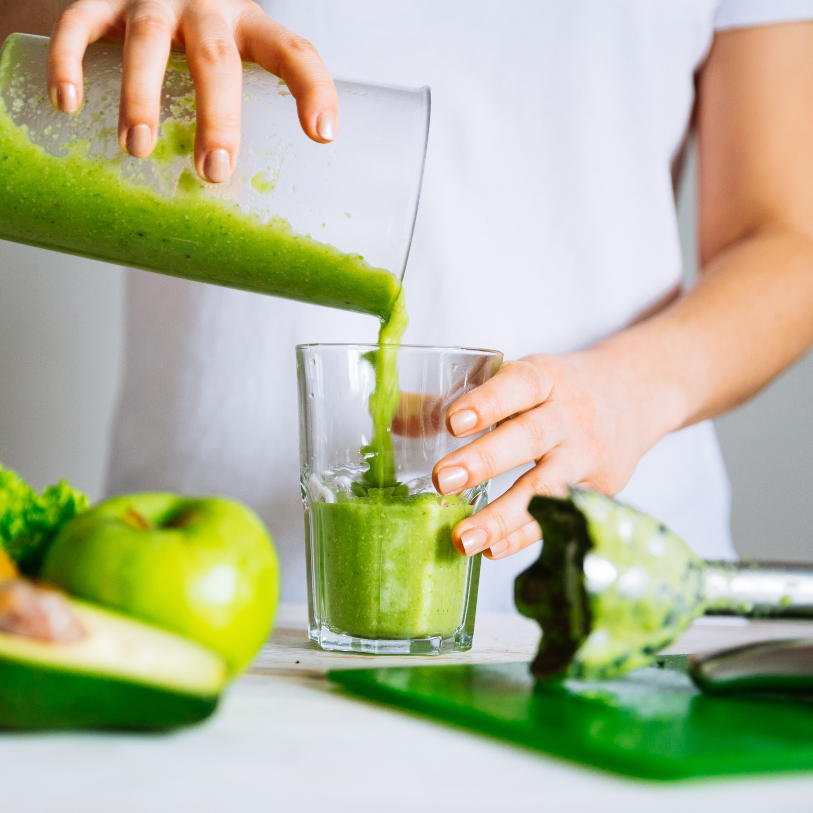
Learn more about detoxing
From ditching toxic beauty and cleaning products, to eliminating processed food and embracing whole, organic food...fully detoxing is a lifestyle commitment!
I have been doing the detox for a while now and i am doing super well so far! I have been trying to detox my life for a while now and i felt like i needed to take it a step further inside my body! Im so glad i found this i cant wait to feel great and hopefully detox my body from all the bad things inside.













